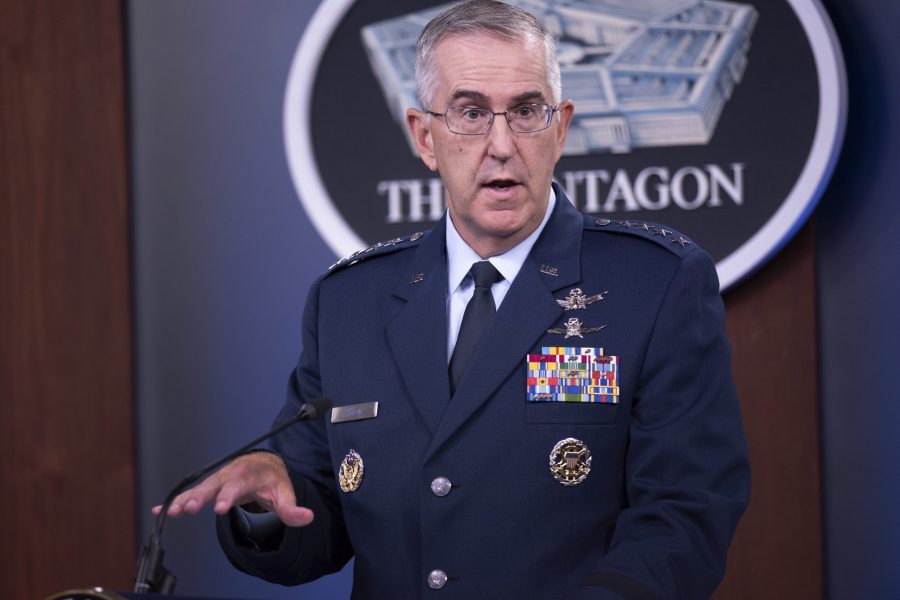Retired Air Force Gen. John E. Hyten, former Vice Chairman of the Joint Chiefs of Staff, will join a commission mandated by the 2022 National Defense Authorization Act looking into the U.S.’s nuclear policies and strategic posture, lawmakers announced March 16.
Hyten’s membership in the 12-person commission will mark one of his first public actions since retiring from the Vice Chairman position this past November. He was succeeded by Navy Adm. Christopher W. Grady.
The commission, as detailed in the 2022 NDAA, will be tasked with conducting “a review of the strategic posture of the United States, including a strategic threat assessment and a detailed review of nuclear weapons policy, strategy, and force structure and factors affecting the strategic stability of near-peer competitors of the United States,” the law states.
As part of that review, the commission will assess the current strategic posture and recommend the best posture moving forward and “the extent to which capabilities other than nuclear weapons can contribute to or detract from strategic stability.”
The commission will also issue a report and brief Congress on its findings no later than Dec. 31, 2022.
Prior to serving as Vice Chairman, Hyten commanded U.S. Strategic Command, overseeing the nation’s nuclear arsenal from 2016 to 2019. In that role, he watched as China rapidly modernized its own nuclear arsenal, building fields of intercontinental ballistic missile silos at a breakneck pace.
That construction wasn’t publicly revealed until 2021, but Hyten said it had previously been a top U.S. secret and demonstrated that “when you have a competitor like China—and Russia—that can move fast, you have to be able to move fast as well. And we still move way too slow.”
Hyten was picked for the commission by Sen. Jack Reed (D-R.I.), chairman of the Senate Armed Services Committee. Hyten will be joined by seven other individuals selected by the chairs and ranking members of the Senate and House Armed Services Committees, jointly announced March 16.
Several of those individuals will also be former Pentagon and State Department officials, including:
- Leonor Tomero, who briefly served as deputy assistant secretary of defense for nuclear and missile defense policy before her position was eliminated in the fall of 2021 in a DOD reorganization that raised some eyebrows in Congress. Tomero was selected by Rep. Adam Smith (D-Wash.).
- Madelyn Creedon, who worked both in the National Nuclear Security Administration (NNSA) and as assistant secretary of defense for global strategic affairs, was selected by Sen. Jack Reed (D-R.I.).
- Former Sen. John Kyl of Arizona, selected by Sen. Jim Inhofe (R-Okla.).
- Lisa Gordon-Hagerty, who previously served as administrator of the NNSA and undersecretary for nuclear security at the Department of Energy, selected by Inhofe.
- Rose Gottemoeller, a former undersecretary for arms control and international security, selected by Smith.
- Marshall S. Billingslea, who most recently served as the special presidential envoy for arms control, holding the rank of ambassador. Billingslea has also worked as deputy undersecretary of the Navy and assistant secretary general for defense investment at NATO. He was selected by Rep. Mike Rogers (R-Ala.).
- Rebeccah L. Heinrichs, a senior fellow at Hudson Institute specializing in U.S. national defense policy with a focus on strategic deterrence. Heinrichs was also picked by Rogers.

